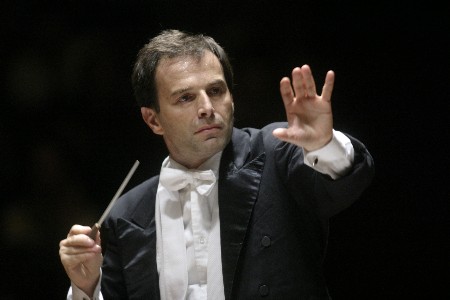Classical Music Review: Harvard-Radcliffe Orchestra
By Caldwell Titcomb

Federico Cortese takes over the helm of the Harvard Radcliffe Orchestra
You might not be aware of it, but the Harvard-Radcliffe Orchestra (HRO) is the oldest symphony orchestra in the country, having begun as the Pierian Sodality in 1808. For the past 45 years, the group was led by composer-conductor James Yannatos, who retired last June. So the HRO on October 24 gave its first concert under its new conductor, Federico Cortese.
Cortese was born in Rome, where he studied composition and conducting, with further training in Vienna and at Tanglewood. From 1998 to 2003 he was Assistant Conductor of the Boston Symphony Orchestra, and currently heads the Boston Youth Symphony Orchestras and other organizations.
For his Harvard debut at Sanders Theatre he chose a program of three masterpieces. The HRO kicked off with Berlioz’s “Roman Carnival Overture” (1843), based on themes from his opera “Benvenuto Cellini.” There is a lyrical English horn solo, nicely dispatched, but most of the piece is a bouncy saltarello that garnered the proper brio.
There followed Debussy’s “Nocturnes” (1897-99), a triptych of tone poems. The first movement is “Clouds,” concerning which the composer spoke of “the immutable aspect of the sky and the slow, solemn motion of the clouds, fading away in gray tones” – something he captured wonderfully in sound. Here again the English horn was especially prominent. “Festivals” is animated and colorful, in which the merrymaking is joined by a procession including a novel use of three muted trumpets. The work ends with “Sirens,” in which the players were backed by the wordless singing of 30 women from the Radcliffe Choral Society and the Harvard-Radcliffe Collegium Musicum. These women recalled the seductive sea Sirens that enticed Ulysses and his men in Book 12 of “The Odyssey.” It was surprising that Radcliffe could provide the two harpists that Debussy wrote into his score.
After intermission the HRO dug into Tchaikovsky’s Fifth Symphony (1888). After leading two performances the composer said, “I have come to the conclusion that it is a failure.” He needn’t have worried: this is one of the greatest symphonies to come out of Russia. He left vague comments about a program, but nothing specific. Fond of low woodwinds, he opens with a gloomy E-minor motto theme in the clarinets, which returns in varied guises in the remaining three movements. The Andante offers an extended and exposed horn solo, which proceeded without mishap.
Tchaikovsky had a lifelong fondness for the waltz, and he provided one of his best as the third movement. The finale ends in triumph.Cortese’s choice of tempi was exactly right all the way through the symphony. But he was not rigid and let the music breathe through appropriate rubato. The players were unfailingly with him and his baton. This concert was indeed an auspicious start for the HRO and its conductor.
The next HRO concert will be on Friday, December 4, at which Cortese will offer Mozart’s “Haffner” Symphony, Mark O’Connor’s “Call of the Mockingbird,” and Shostakovich’s finest symphony, the Fifth.

Sounds like a good program. I missed it, but am looking forward to December’s. I’ll just note that tickets go for as little as $6-$12–for a full orchestra in Sanders you can’t really argue, even if it’s students.